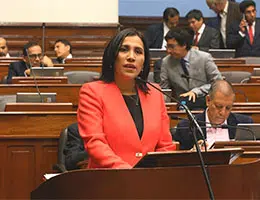 The verb interpellate has its etymological root in the Latin word interpellāre . According to what was stated by the Royal Spanish Academy ( RAE ) in the first meaning of the term, the concept refers to questioning an individual to provide certain explanations or compelling him or her to comply with an obligation .
The verb interpellate has its etymological root in the Latin word interpellāre . According to what was stated by the Royal Spanish Academy ( RAE ) in the first meaning of the term, the concept refers to questioning an individual to provide certain explanations or compelling him or her to comply with an obligation .
For example: "The opposition deputies intend to question the Minister of Security due to the recent murders that shocked society" , "Legislators seek to question the Secretary of Energy about the rate increases" , "The head of the security force to explain why its troops committed such an atrocity .
It is common for the notion to be used to refer to the interrogation to which a member of the Executive Branch is subjected by members of the Legislative Branch with the aim of clarifying issues related to a certain matter. Many times, the decision to question an official is intended to resolve his or her political responsibility in a given matter.
If a country's economy collapses after several decisions made by the national government, for example, deputies may intend to question the Minister of Economy to explain what he was looking for with his measures and what his plan is to get out of the crisis. crisis, to cite one case.
In a broader sense, the idea of questioning is used regarding a symbolic or abstract question . A journalist can affirm that society is questioning communicators since people understand that the media is not telling the truth in its desire to protect the rulers.
In the context of a Parliament, the word interpellate can be defined as the action that a senator or deputy carries out when he presents to the table or to the Government itself a broad discussion that is not directly part of the propositions or drafts. law.
The family noun for this term is interpellation , and it is defined precisely as the action and effect of interpellation. The institution known by this name emerged in the Parliament of the United Kingdom, more precisely in the House of Commons , the name given to the lower houses also in Canada.
 A very particular communication takes place in the House of Commons, in which its members are authorized to question the ministers of the royal cabinet and the latter have the obligation to respond to their questions and complaints , in conversations that often They become very hot.
A very particular communication takes place in the House of Commons, in which its members are authorized to question the ministers of the royal cabinet and the latter have the obligation to respond to their questions and complaints , in conversations that often They become very hot.
Given that the term interpellate is not very common in everyday speech but is reserved especially for the field of journalism, we will list below some of its synonyms: ask, interrogate, beg, require, claim, exhort, demand , request, demand and request . Its most used antonyms are the following two: respond and reply .
As we can see by observing the various synonyms just presented, there is a constant element in all of them: the idea of externalizing the need for an explanation regarding a given matter. All of these terms refer to an action that expects another in return, and the meanings of interpellate indicate that the desired response is oral, or at least it must be a message and not a material object.
In the dictionary of the Royal Spanish Academy there is a meaning that is currently out of use: "asking someone to help us or to support and protect us." In the example proposed below we talk about "interpellating God for the people", that is, "asking" or "imploring" Him to help and protect people.
